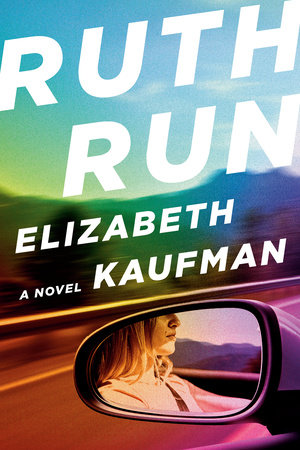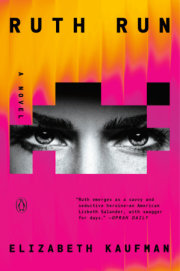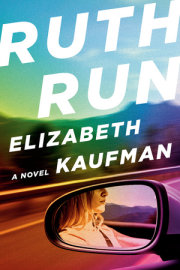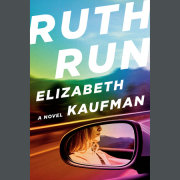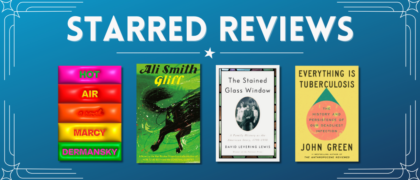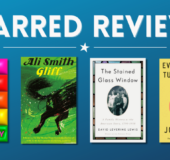1RuthThe Cookie VanishesI was dreaming about a ginger cookie-soft-centered, crunchy with sanding sugar-when the alarms went off. It was three a.m., and somewhere someone had hit one of my electronic tripwires, triggering phone alerts that shocked me awake. I flung my arm to mute them, then lost a moment wondering what thief falls asleep mid-thievery. In my defense, a yearslong cybercrime can get dull.
I checked my laptop. Someone had poked the software that transferred money from my East Coast accounts through the hacked firewalls. They'd halted a funds transfer. Had they found any of the offshore accounts? Either way, it was time to delete everything and go. Past time. My years of peaceful bank robbery were done. As I started removing scripts and scrubbing log files, I asked myself for the hundredth time: cover-up first or getaway? That answer should be in some crime FAQ. But a compelling advantage of digital theft is that your hunters rarely start where you live. Someone had discovered my work and was probably searching for me, but my apartment was dim and quiet. I ordered myself not to freak my shit. I still had time to clean up and get out. No one could see me here.
2MikeWatch Her RunRuth adjusted her shoulder bag and turned a slow 360. She wore her brown jacket, jeans, running shoes, a plain white blouse. In the bag were two prepaid phones still in plastic, a charger, toothbrush, hairbrush, wallet and passport, a pen and a small yellow pad, two changes of socks and underwear, large sunglasses, a pink BIC lighter, one very good blond wig, a Red Sox cap, and $25,000 in twenty-dollar bills, still stacked tight in violet bank bands.
Early sunshine streamed into the room, illuminating the airborne dust. She stood and studied every surface. I knew she was wondering what she had forgotten, what was left to help a man hunting her. She'd swapped her hard drive for a backup full of card games and crochet animal patterns. The original she'd zeroed, baked in the oven, and shoved into her bag. She examined the books, stacked in no order on the crappy plywood shelves. Account numbers scrawled in the margins? No. Random, self-betraying scribbles? Impossible. But this situation was outside her experience. She had no idea how capable or relentless my team might be. Or who we were.
There wouldn't be much to find in that apartment: Goodwill plates and cutlery, plastic cups, a French press that made coffee at once weak and full of grit. Getting rich had been a lean process. The refrigerator remained empty. She ate packaged crap when she bothered to eat-an unholy assortment of turkey jerky and the occasional Trader Joe's frozen ethnic dinner. There was a cheap window bird feeder, and her father's old violin in its bright painted case on a side table. I'd been sure she would take it. How far did she expect to get, really, with me in pursuit? A flowered violin wouldn't sink her. With a little planning, she might even have stored it somewhere. But there it sat, and she walked away from it.
She couldn't be certain I'd found her hack or the complex web of scripts and small databases that overlay it. Her system looked innocuous if a person happened to stumble onto it; pieces were spread across the internet. But we must have triggered an alert. At 0300 hours, we'd probed the relays to her offshore account, and the first overnight transfer from the US banks had failed. The next began on schedule, but we'd spooked her. She had already started to dismantle everything, shutting it down. She must have planned to burn it all behind her someday. Still, she'd needed almost five hours to disable and delete the scripts and databases that had collected and directed her stolen fortune over the last forty-five months. The compromised microchips had to stay, of course, but they were useless without her knowledge. Somewhere she must have left me a clue to their access. It would be my challenge to find it.
Ruth closed her eyes. She always got away. That's how it worked. I'd made sure of it. This time, she expected to be staggeringly rich. The light caught her hair, her cheekbone, the curve of her ear. It was a face to be studied in black and white or while she slept. Awake in the world, she had the trick of blurring against her background like a rare nocturnal moth or the bird that hunts it. I memorized her face on the screen. It might be my last chance to look at Ruth before she could return my scrutiny.
She turned again, clockwise this time, unwinding herself from that room, that home, then walked out through the tiny kitchen, carefully locking the door behind her.
3MikeHer First Wrong TurnOn the street, Ruth strode to her car. It was the dry season in Northern California. The sky was a relentless blue, and fuchsia bougainvillea sprawled across the trellised porches. She didn't stop to admire it. She didn't look for me. She climbed into her grubby Civic, started it, and pulled into the street. Then, at the stop sign, she hesitated. Parked around the corner, engine running, we waited for her to choose an escape route. I expected she would turn toward El Camino, work her way to Marsh Road, and go north on 101. She had an old cash-bought car parked along the way to trade into. I expected her to bolt out of the Bay Area, as much as anyone can bolt through that morning traffic. But there was still her assistant-in-crime, stupid hapless Thom. He had written most of the software for the theft. His name, with hers, was on the Caymans account. He'd be in his cubicle, staring at the mini crossword, waiting obliviously for the posse (that was us) to seize him.
It had been Ruth's first large heist; she had mishandled her subordinate. Thom had not received the alerts, did not have an escape plan. She should not have involved him in the first place. She should not risk herself to get him out. Too much to hope, in that moment, that she'd turn toward me. I knew she wasn't ready. I approved her loyalty but faulted her judgment trying to save Thom. That choice was her first hint of instability.
A honk behind her-Ruth startled and turned right. She was going to the office.
4RuthNo Bread in MoabI love one thing more than money. Food. It's a fact about me. You know when you're lying there after sex and your partner asks: What are you thinking about? They want to hear "you" or "us" or "love," but my answer is always food. Not food in general. It's something specific: maybe a McIntosh apple warm off an autumn tree or a Neuhaus dark chocolate praline with a double shot of perfect espresso or a hot, fresh croissant. Of course, I don't share these thoughts. I'm aware my answer doesn't fit the storyline.
Years ago, I put aside my first love to go after my second. Because food can't buy money, but money can buy food and most other things as well, like security of sorts and free time and maybe a good dog with a yard to play in. Even things without price tags come easier when you're rich: health, friends, safety in the dark. Some people plan to sleep when they're dead; I've promised myself to eat when I'm rich. By that, I mean I'll eat what I want. In the meantime, food can't be important.
It's stupid to talk about life balance; distraction won't advance any serious goal. I think that balance shit comes from successful people trying to knock out competitors, tossing misdirection behind them like mental tack strips. Every person has a hard limit for focus, for effort, for love. No one is smarter eating Stumptown Cold Brew Coffee Ice Cream at the keyboard or spreading a ripe Brie de Meaux on a thin slice of toasted baguette (with a strip of prosciutto, a dab of fig preserve, and black pepper) while she checks undocumented gates in a microchip.
So I quit food, and I also gave up sex. It wasn't productive. When I'd first moved to California, I'd hooked up with the best microchip engineers I could find. They loved to lecture a girl about their work; their foreplay amounted to a short course in electrical engineering. Soon enough, I'd noticed their libraries were all the same and decided it was more efficient just to read the books. Hanging on some rich arm was never my goal. I always knew to get my own money, I'd have to put off everything else.
I had my failures, though. When I drove away from the Menlo apartment to collect Thom, I stopped at the corner, and all at once the car smelled like cheese bread. There's a Draeger's grocery there where they make loaves of asiago sourdough. Some days, I'd wandered through its bakery section, smelling the cheesy air, imagining eating a whole loaf. I never touched food like that, though. The time for good things would be after I was rich and safe. Still, the car suddenly smelled like asiago bread, and for a moment, I lost concentration. I forgot that someone might be coming for me, that I needed to find Thom and get out. Then some jerk honked, and I remembered where in life I was. So I turned toward the office, the place my hunters (if there were hunters) were sure to come. I drove my own car, wore my own hair, and carried almost three pounds of stolen cash. Brilliant.
5RuthOperation Nitwit RescueI was the senior product line manager for bank security at the world's largest network equipment company. You might know them. Maybe you've cursed their stock price or power-cycled one of their routers or office phones, or all of the above. After I designed my hacked microchip, I needed to get it onto a product that would give me access to lots of vulnerable banking systems. I got a job at that big company and had them integrate my chip with a turnkey system to bring legacy mainframes online, to defend them, and to steal from them.
My office was on the fourth floor in one of a series of mostly identical buildings on the San Jose campus. Thom's cubicle was in the same building, one floor down. I pulled into the parking lot and backed into a space with a view through the glass walls of the rear entryway. I sat behind the wheel and watched the building. Was it too busy? Too quiet? I'd planned my escape as a faraway exercise, not a sneaking-through-my-normal-life thing. I was going to have to improvise.
I collected my bag and stepped out of the car. A black SUV swerved into the lot and up to the back door. Two squared-off men in tan Dockers climbed out, went through the door, and turned toward the elevators. Each of them in turn pressed the call button. They really wanted an elevator. Silicon Valley had a lot of relatively harmless preppy men prone to double-pushing call buttons. Even so, I decided to take the stairs.
My bag was awkward, and the jacket too warm. Apparently I should have been jogging daily with pounds of money in a fanny pack. Another missed opportunity. As I got to the third floor, the fire door swung inward and those two men came through: half-inch government lanyards, name badges turned backward (the universal symbol for an out-of-bounds institutional goon), and sidearms. I ducked my head, stepped back, let my face settle into boringness. Their eyes skimmed past and down the stairwell. If they were looking for me, they were failing, but surely it was too soon. I stared vacantly at the carpet. "Hurry," said the man in back. They headed upstairs, and I stepped sideways through the closing door.
Thom wasn't in his cubicle. His red windbreaker was draped on the chair; his ID lay next to the keyboard. Toby in the next cubicle tipped his chair back. "He's not there."
He clicked his mechanical pencil in a worried way; the lead was seriously overextended. "I see that," I said. "Where is he?" I didn't know what Thom had told him. I wasn't taking the time to find out.
Toby glanced around. He lowered his voice. "Some dude from security and a lady from HR came for him. I think they're in the conference room." He clicked his pencil again, pointed it toward the south end of the building, and we watched the lead fall onto the carpet. "They said it was urgent." What were the odds that slow Thom was mixed up in a second major white-collar crime?
"I bet I need him more than they do," I said. "If he gets back before I find him, please tell him to call me." And I picked up the ID and the jacket like that was a normal thing to do. "See ya." I half waved and turned away. Then turned back as Thom's screensaver came on. It was a photo of the pair of us, clearly and obviously on Seven Mile Beach, Grand Cayman, shading our eyes against the sun and laughing like, well, exactly like two people who had just robbed a bank-several banks, in fact.
The nitwit bastard! I'd been so clear about the need for secrecy. And I'd avoided cameras for years. When cell phones got them, it seemed that everyone's face would be everywhere, but people only want pictures of themselves. I became the photographer, never the subject. I couldn't know when or why I'd need to disappear; it just seemed inevitable. Now my only casual photo in the last six years was displayed brilliantly dead center of my flight path. What else might be on that computer? I had no good choices. I couldn't throw it out a window-they didn't open. I also couldn't smash it and flush the pieces down the toilet or light it on fire, not with Toby sitting right there. Rescuing Thom had been a weak impulse. I should have vaporized him months ago. I headed for the conference room.
From the hallway, I could see Thom through the glass, slumped and sorry-looking; a blond woman in glasses with statement frames, HR for sure; and an older guy dressed like a mall cop, both with company badges. No one had coffee; the woman had a pad and a big binder. Everyone looked tense. The door was half-open, and I guessed they were waiting for more people, maybe the Dockers brigade.
I'd always been a planner. This theft had taken years, first to design the hardware, then to get it into production, to ensure my target banks acquired it, to write the software (OK, to convince Thom to write the software), collect the money, store it in safe havens offshore, and always to watch my own back. I'm not complaining about the effort, just pointing out that I'd trained for my vocation like my colleagues trained for marathons, except I hadn't gone around bragging about it. Big success takes a big plan, but big plans have problems. It's hard to improvise-even in the gaps, the way out is usually predetermined. For example, it wasn't enough to extract Thom from the conference room; we needed to take the back stairwell and go through the Operations Center, if I was going to get us discreetly to my second car parked on that side of the lot. Also, I'd come to see that every secret casts a shadow. As things moved and changed around it, my plan stood still; eventually that stillness would draw attention. I'd read that predators react to motion, but I thought the people hunting me might be searching exactly for things in the wrong place, things that did not move. Then again, the dudes in the stairwell hadn't seemed too advanced.
Copyright © 2025 by Elizabeth Kaufman. All rights reserved. No part of this excerpt may be reproduced or reprinted without permission in writing from the publisher.

